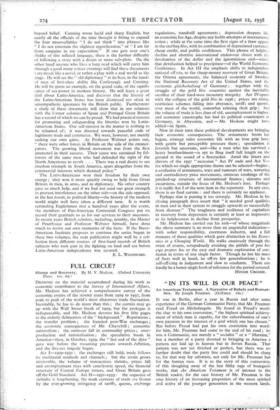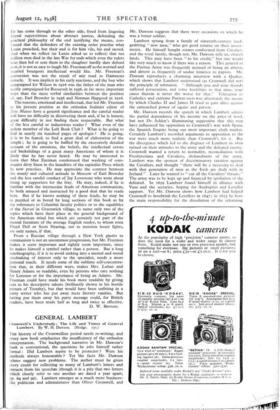An American Testament. A Narrative of Rebels and Roman- tics.
By Joseph Freeman. (Gollancz. 16s.) •
" IN ITS WILL IS OUR PEACE "
IT was in Berlin, after a year in Russia and after some experience of the. German Communist Party, that Mr. Freeman read Freud on Michelangelo. He found in Freud's words the clue to his own conversion, " the highest spiritual achieve- ment of which man is capable, for the subordination of one's own passions in the interest of a goal which one has chosen." But before Freud had put his °Urn conviction into words for him, Mr. Freeman had come to the end of his road ; he was a Communist, not merely a " socialist " or a " Marxian," but a member of a party devoted to bringing to America a pattern not laid up in heaven but in Soviet Russia. That pattern was not yet finished or perfect, but there was no further doubt that the party line could and should be clung to, for that way lay salvation, not only for Mr. Freeman but for the human race. It is as the story of this conversion, of this sloughing away of the last filthy rags of bourgeois works, that An American Testament is of interest to the British reader, for the case history of Mr. Freeman is the case history of an increasing proportion of the most spirited and active of the younger generation in the western lands.
He has come through to the other side, freed from lingering liberal superstitions about abstract justice, defending the practical philosophy of the end justifying the means, con- vinced that the defenders of the existing order practise what Lenin preached, but their end is for him vile, his end sacred. And when we reflect (as Lenin asked us to reflect) that ten million men died in the late War for ends which even the rulers who, then led or sent them to the slaughter hardly dare defend now, it is not as easy to laugh Mr. Freeman off as the worried and wearied bourgeois intellectual would like. Mr. Freeman's conversion was not the result of any road to Damascus miracle. It was implicit in his early reactions, and the boy who campaigned for Wilson in 1916 was the father of the man who tacitly campaigned for Roosevelt in 1936, in far more important ways than the mere verbal similarities between the position of, say, Earl Browder in 1936 and Norman Hapgood in 1916.
The reasons, emotional and intellectual, that led Mr. Freeman to his present position as the orthodox Stalinist editor of New Masses have a general significance and the careful reader will have no difficulty in discovering them and, if he is honest, great difficulty in not finding them respectable. But what of the less careful or industrious reader ? What even of the ardent member of the Left Book Club ? What is he going to find in nearly six hundred pages of apologia ? He is going, it is to be feared, to find a great deal of elaboration of the simple ; he is going to be baffled by the excessively detailed account of the emotions, the beliefs, the intellectual errors and backslidings of a great many Americans of whom it is. likely that he has never heard. He may be interested to learn that Max Eastman condemned that washing of com- munist dirty linen in the laundries of the capitalist Press which he now practises. He may appreciate the contrast between the manly and cultured attitude in Moscow of Earl Browder and the less candid conduct of Jay Lovestone who went about lining up supporters for the fray. He may, indeed, if he is familiar with the internecine feuds of American communism, be both amused and instructed by a good deal that he reads here. But if he knows nothing of these feuds, he may be as puzzled or as bored by long sections of this book as by the references to Columbia faculty politics or to the squabbles of the literati in Greenwich village, to name only two of the topics which have their place in the general background of the American mind but which are certainly not part of the mental furniture of the average English reader, to whom even Floyd Dell or Scott Nearing, not to mention lesser lights, are only names, if that.
From a Russian village through a New York ghetto to communism is not an uncommon progression, but Mr. Freeman makes it seem important and rightly seem important, since he makes himself a symbol rather than a person. But a long autobiography, if it is to avoid sinking into a mental and moral stocktaking of interest only to the specialist, needs a more personal touch. It needs some of the sublime self-concentra- tion that, in their different ways, makes Mrs. Luhan and Henry Adams so readable, even by persons who care nothing for Lorenzo or for the importance of being an Adams. Mr. Freeman could have made his book more readable by giving rein to his descriptive talents (brilliantly shown in his hostile picture of Trotzky), but that would have been unfitting in a party writer who has put away mere literary vanities. But having put them away his party message could, for British readers, have been made half as long and twice as effective.
D. W. BROGAN.







































 Previous page
Previous page